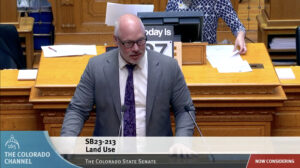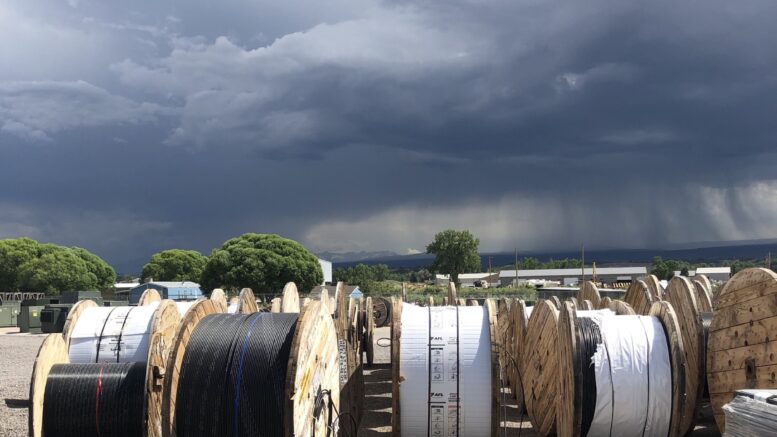Colorado legislators from both sides of the aisle have joined telecommunications providers in questioning a proposed fee for those companies and local governments to run broadband infrastructure along public rights of way, just one week before a scheduled vote on the plan.
However, Colorado Department of Transportation Executive Director Shoshana Lew maintains that right-of-way fees are necessary to balance public and private interests, saying that private firms shouldn’t get the same benefits as utilities even as the state pushes to expand broadband.
The debate, which flared Friday during a Joint Budget Committee hearing for CDOT, could come to a head next week when the Colorado Transportation Commission votes whether to establish a one-time fee and an annual fee for telecom providers to access state-owned land. But if the CTC moves approves the fee, there are signs that the Legislature may step in, as the chairman of the Joint Technology Committee last week referenced a potential bill to sort out the matter.
The broadband expansion push
The federal government this spring awarded Colorado $826 million to build out broadband infrastructure — a total that Gov. Jared Polis said could extend needed fiber to 99% of the state. The award from the 2021 Infrastructure and Investment Jobs Act must be spent by the end of 2027 or returned, however, meaning the state must deploy its resources quickly and efficiently.
With CDOT-owned highway right-of-way needed to get fiber out to some of the hardest-to-reach areas of the state, transportation-department officials have been working to develop a fee that would allow telecom firms to use the property at a rate that reflects fair market value. The proposal that will go before the CTC next week would charge those firms a one-time permitting fee of five cents per foot of fiber, as well as annual fees of three cents per foot in rural counties and 10 cents per foot in counties with populations of more than 200,000 people.

Rights of way along state roads such as this highway in western Colorado are viewed as crucial to expanding broadband statewide.
While the third iteration of the proposal — crafted after the first two drew severe criticism — represents a proposed fee decrease of around 90% from earlier plans, opponents say it remains too expensive given the long stretches of highway along which the infrastructure may travel. Those opponents have included telecom firms and local governments that may end up doing the work themselves, but they also now include legislators who question whether the fees work against the stated purpose of using federal funds to get broadband to a wide swath of areas.
Sen. Jeff Bridges, D-Greenwood Village, was the most vocal critic of the idea during Friday’s CDOT budget hearing, saying he is “extraordinarily unhappy” with the proposal. The fees sought by CDOT — such as $13,068 one-time payment and an annual payment of $7,841 proposed by it to use rights-of-way to install fiber for 49.5 miles from Pagosa Springs to Ignacio — could make service too expensive for some rural residents and undercut the expansion effort, he said.
“The broader goal of getting people online”
“I think we as a state have to decide if state government is all in for getting people connected across the state … or if we are going to say that three quarters of a billion (dollars) is enough and people will have to fight it out for the money,” Bridges said. “I still think that having this (fee) at all goes against the broader goal of getting people online. And I would like to see these (providers) treated more like utilities.”

Colorado state Sen. Jeff Bridges speaks in the Senate during the recent special legislative session.
Lew, however, noted that telecom firms are not utilities and argued that is a big point of the fee program — to bring in what she called small amounts of revenue from companies that will turn around and make profits after taking federal money to expand broadband infrastructure. She also pushed back against Bridges’ characterization that homeowners in Ignacio will be getting hurt the most, saying the loudest complaints she gets are from “large lobbying firms on the East Coast, where I think it’s fair to say their hearts are not with Ignacio.”
“The issue as I see it is they don’t really want to be regulated like a utility, but they still want the benefits of being a utility,” Lew told the JBC. “And our attitude is: Pick one.”
But it wasn’t just Bridges on the powerful, budget-setting JBC who criticized the CDOT fees plan.
Other concerns about right-of-way fees
Rep. Rick Taggart, the Grand Junction Republican who is sitting on the committee while GOP Rep. Rod Bockenfeld of Watkins is undergoing cancer treatment, said small providers in his area originally said that the plan could put them out of business because of its high costs. And Sen. Barbara Kirkmeyer, R-Brighton, said that she is bothered far more by the ongoing fees than the one-time fee, noting those costs could push providers to run infrastructure through private land and create a messy process in doing so.
“I get that there are companies that are going to make money off of this,” Kirkmeyer said Friday. “But it’s also about the benefits and the services to the citizens of Colorado, no matter where they live.”
And the JBC doesn’t appear to be the only committee wanting to step into the process. Speaking Thursday at the Adams County Regional Economic Partnership’s pre-session legislators’ breakfast, JTC Chairman. Sen. Kevin Priola, D-Henderson, said his committee has pulled a bill “to deal with that and to try … and push these conversations forward.”

Colorado state Sen. Kevin Priola speaks in the Senate during the 2023 regular legislative session.
“Usually, the big hurdle down there is funding,” Priola said, referring to the Capitol. “This is an example where we just have areas of the government and the private sector that can’t get together.”
Another bill being written
La Plata County Commissioner Matt Salka earlier told The Sum & Substance that local governments are working through Colorado Counties Inc. to craft a bill that would bar state agencies from charging annual fees for broadband-infrastructure installation along rights of way.
In presenting the free proposal to the CTC in November, CDOT Intelligent Transportation Systems Manager Alexandra Axley emphasized that federal and state law requires CDOT to be compensated at fair-market value for allowing use of the rights of way by private companies.
But a coalition of telecom firms and business groups told CDOT in a letter that it couldn’t find federal statute requiring fair-market value compensation and noted the Federal Highway Administration does not require fair-market-value fees for right-of-way access to federal roads.
Coming vote on right-of-way fees
Bridges noted that this likely will be Colorado’s final shot at drawing significant federal funds to expand broadband. Thus, he said, the state must use what it has to put in fiber, particularly to far-flung rural communities where providers will struggle to achieve a return on the massive investment that they would have to make to get it there.
“It just doesn’t seem to me that there is alignment on making sure it is as fast and efficient as possible to make sure these folks have internet,” Bridges said.
But Lew emphasized that rights of way have value and that the state should be compensated for that value if it allows private firms to use the land for their gain. The current proposal represents the lowest cost that CDOT could charge for that usage and still feel comfortable it is receiving fair-market value, she added.
“I just don’t think that valuing a public good means that a public agency is not supportive of a goal that the state has,” she said.
The CTC is scheduled to vote on the rights-of-way fees proposal around mid-afternoon on Dec. 21 as part of its monthly meeting.
